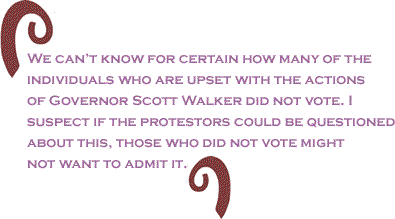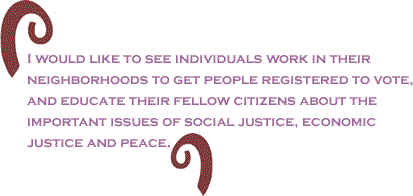As
I watched the numbers of protestors in Wisconsin grow to
seventy thousand, I wondered how many of these people did
not vote in November of 2010. I did not recall how close
the Wisconsin off-year election was nor did I remember how
wide the Obama victory was in Wisconsin in November of 2008.
In
looking for election results and turnout, I found the source
for this data is The Wisconsin Government Accountability
Board (GAB)
which produces statistics on voter turnout and the number
of registered voters. The GAB is the source for all the
numbers in this commentary.
We
can�t know for certain how many of the individuals who are
upset with the actions of Governor Scott Walker did not
vote. I suspect if the protestors could be questioned about
this, those who did not vote might not want to admit it.
It is probably similar to comparing the number of people
who now claim they were in D.C. for MLK�s �I Have a Dream�
speech with the real turnout. If those who now claim to
have been there were really there, the mall would not have
been able to come close to holding them all.

Voters
in Wisconsin have a system that is very easy to use. Voters
are not required to declare a party and anyone who can provide
evidence of residence can register and vote on election
day.
Voting
is important. I have never missed an election and have voted
absentee while serving in the U.S. Army outside the USA
and when I knew I would be away from home. In one local
election, absentee votes were counted to determine the winner.
I had voted absentee and my candidate won by only one vote.
So please don�t tell me your vote does not count!
There
are folks on the left who think it is a waste of time to
vote because the system is corrupt. I would like to see
individuals work in their neighborhoods to get people registered
to vote, and educate their fellow citizens about the important
issues of social justice, economic justice and peace. Our
election system needs serious changing and voting is a key
element to bringing about change.

We
know voter turnout is lower for off-year elections, so how
bad was it in Wisconsin in November of 2010?
According
to the data from the Wisconsin GAB, the turnout was 49.7
percent of the voting age population in November of 2010.
That�s not an impressive number, but additional meaning
is provided by taking a look at the turnout for the 2008
Presidential election. In November of 2008, 69.2 percent
of the voting age population voted.
In
November of 2010 a total of 2,171,331 votes were cast by
a voting age population of 4,372,347, so less than half,
2,201,016 people of voting age, did not vote. Republican
Scott Walker defeated Democrat Tom Barrett (Mayor of Milwaukee)
by a margin of 52.25% to 46.48% or by 5.77% of the vote.
However, the percentages don�t tell as clear a picture as
looking at the vote totals. Walker beat Barrett 1,128,941
to 1,004,303 or 124,638 votes. That may seem like a big
margin unless you do some division and realize that the
winning total is only 2.85% of the voting age population
and only 5.66 percent of the voting age population that
did not vote. These numbers make it clear that the
results could have been very different.
It
is also interesting to look at how the turnout in the 2010
off-year election compares with the Presidential election
of 2008.
Since
November of 2008, the voting age population (VAP) of Wisconsin
increased by 41,652. In November of 2008 the VAP was 4,330,695
and the turnout was 69.2 percent because 2,996,869 people
voted. Obama beat McCain 56.22% to 42.31%. This is a margin
of 13.91 and a vote count of 1,677,211 to 1,262,393 for
a difference of 414,818 votes.
Ok,
so what happened in November of 2010? Obama�s margin of
victory over McCain was 3.32 times larger than Walker�s
win over Barrett.
548,270
more votes were cast for Obama in 2008 than were cast for
Walker in 2010. In short, Barrett could have defeated Walker
if those who voted for Obama had been fired up enough to
get out and vote.
Walker
could have been defeated if only 68 percent of the Obama
voters turned out and voted for Barrett. I arrive at this
number by dividing the total Walker vote count by the total
Obama vote count and rounding up from 67.3 percent to the
68 percent. It appears the right was fired up and the left
wasn�t.
Some
may conclude that Obama supporters did not vote because
they were discouraged by his (Obama�s) performance.

With
most, if not every, precinct in the country reporting lower
turnout in off-year elections, the data for Wisconsin is
no exception. Every off-year election since 1948 shows the
same pattern.
A
couple of interesting comparasion notes are the following:
 Do
the elections in-between the big ones suffer not only from
voter remorse but also voter burnout? Some observers think
voters today are busy trying to survive and don�t want to
be bothered. Others may decide that Americans are just plain
stupid and get what they deserve. Another approach would
advance the thought that the long overbearing Presidential
elections every four years wear us out and we just don�t
have the energy to get excited enough about off-year elections
to actually vote. Some on the left are pleased that Walker
is in because it makes it a very obvious battle. Do
the elections in-between the big ones suffer not only from
voter remorse but also voter burnout? Some observers think
voters today are busy trying to survive and don�t want to
be bothered. Others may decide that Americans are just plain
stupid and get what they deserve. Another approach would
advance the thought that the long overbearing Presidential
elections every four years wear us out and we just don�t
have the energy to get excited enough about off-year elections
to actually vote. Some on the left are pleased that Walker
is in because it makes it a very obvious battle.
Walker
made it clear to voters who he was and what he would do
about the Wisconsin budget and surprised many with his plan
to weaken unions; now there are new battles to fight.
The
struggle continues�.
Below
are links to the data used to produce this commentary.
The
Wisconsin Government Accountability Board (GAB)
gab.wi.gov/elections-voting/statistics
WI
Voter Turnout History 1948 to Present:
blackcommentator.com/416/416_cover_2_lh_wi_voter_turnout_history.pdf
WI
2010 General Election Results:
blackcommentator.com/416/416_cover_2_lh_wi_2010_results.pdf
WI
2008 General Election Results:
blackcommentator.com/416/416_cover_2_lh_wi_2008_general.pdf
WI
2004 General Election:
blackcommentator.com/416/416_cover_2_lh_wi_2004_general.pdf
WI
2000 General Election:
blackcommentator.com/416/416_cover_2_lh_wi_2000_general.pdf
BlackCommentator.com Publisher and Chief Technical Officer Peter Gamble, is the
recipient of a national Sigma Delta Chi award for public
service in journalism and numerous other honors for excellence
in reporting and investigative reporting. The �beats� he
covered as a broadcast journalist ranged from activism in
the streets to the State Department and White House. The
lure of a personal computer on his desk inspired a career
change in 1985 and an immersion into what he saw as the
future of communications. The acquisition of computer programming
skills made it possible for Peter to achieve an important
level of self-reliance in the technology of the 21st century
and to develop BlackCommentator.com. Click here to
contact Peter.
|

